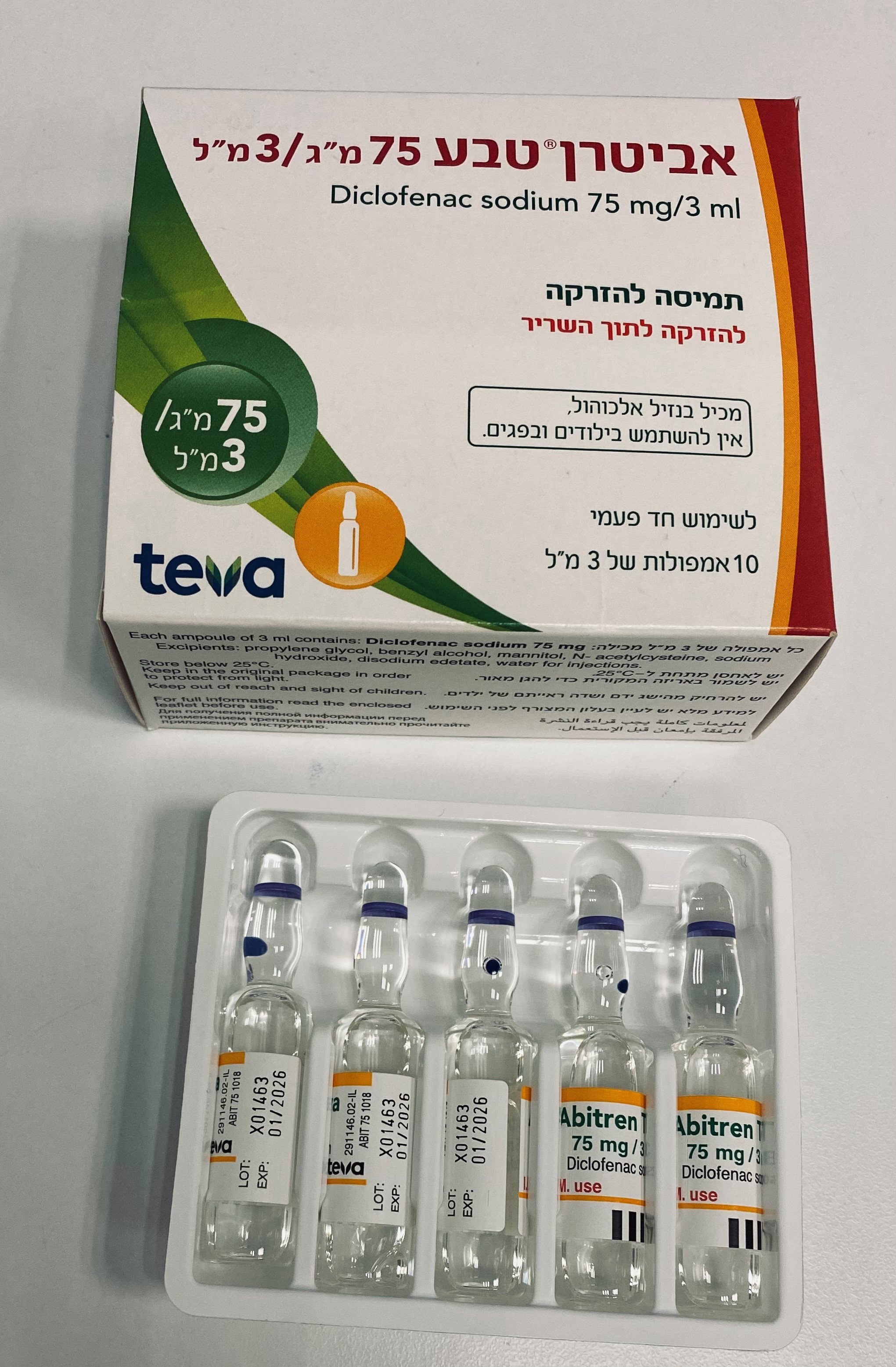Quest for the right Drug

אביטרן טבע ® 75מ"ג/3 מ"ל ABITREN TEVA ® 75 MG/3 ML (DICLOFENAC SODIUM)
תרופה במרשם
תרופה בסל
נרקוטיקה
ציטוטוקסיקה
צורת מתן:
תוך-שרירי : I.M
צורת מינון:
תמיסה להזרקה : SOLUTION FOR INJECTION
עלון לרופא
מינוניםPosology התוויות
Indications תופעות לוואי
Adverse reactions התוויות נגד
Contraindications אינטראקציות
Interactions מינון יתר
Overdose הריון/הנקה
Pregnancy & Lactation אוכלוסיות מיוחדות
Special populations תכונות פרמקולוגיות
Pharmacological properties מידע רוקחי
Pharmaceutical particulars אזהרת שימוש
Special Warning עלון לרופא
Physicians Leaflet
Adverse reactions : תופעות לוואי
4.8 Undesirable effects Adverse reactions are ranked under the heading of frequency, the most frequent first, using the following convention: very common: (>1/10); common (> 1/100, <1/10); uncommon (> 1/1,000, <1/100); rare (>1/10,000, <1/,1000); very rare (<1/10,000); not known: cannot be estimated from available data. The following undesirable effects include those reported with other short-term or long-term use. Table 1 Infection and Infestations Unknown Injection site necrosis. Blood and lymphatic system disorders Thrombocytopenia, leucopoenia, anaemia (including haemolytic and aplastic Very rare anaemia), agranulocytosis. Immune system disorders Rare Hypersensitivity, anaphylactic and anaphylactoid reactions (including hypotension and shock). Very rare Angioneurotic oedema (including face oedema). Psychiatric disorders Very rare Disorientation, depression, insomnia, nightmare, irritability, psychotic disorder. Nervous system disorders Common Headache, dizziness. Rare Somnolence, tiredness. Very rare Paraesthesia, memory impairment, convulsion, anxiety, tremor, aseptic meningitis, taste disturbances, cerebrovascular accident. Unknown Confusion, hallucinations, disturbances of sensation, malaise. Eye disorders Very rare Visual disturbance, vision blurred, diplopia. Unknown Optic neuritis. Ear and labyrinth disorders Common Vertigo. Very rare Tinnitus, hearing impaired. Cardiac disorders Uncommon* Myocardial infarction, cardiac failure, palpitations, chest pain. Not known Kounis syndrome Vascular disorders Very rare Hypertension, hypotension, vasculitis. Respiratory, thoracic and mediastinal disorders Rare Asthma (including dyspnoea). Very rare Pneumonitis. Gastrointestinal disorders Common Nausea, vomiting, diarrhoea, dyspepsia, abdominal pain, flatulence, anorexia. Rare Gastritis, gastrointestinal haemorrhage, haematemesis, diarrhoea haemorrhagic, melaena, gastrointestinal ulcer with or without bleeding or perforation (sometimes fatal, particularly in the elderly). Very rare Colitis (including haemorrhagic colitis and exacerbation of ulcerative colitis or Crohn's disease), constipation, stomatitis (including ulcerative stomatitis), glossitis, oesophageal disorder, diaphragm-like intestinal strictures, pancreatitis. Unknown Ischaemic colitis. Hepatobiliary disorders Common Transaminases increased. Rare Hepatitis, jaundice, liver disorder. Very rare Fulminant hepatitis, hepatic necrosis, hepatic failure. Skin and subcutaneous tissue disorders Common Rash. Rare Urticaria. Very rare Bullous eruptions, eczema, erythema, erythema multiforme, Stevens-Johnson syndrome, toxic epidermal necrolysis (Lyell's syndrome), dermatitis exfoliative, loss of hair, photosensitivity reaction, purpura, allergic purpura, pruritus. Renal and urinary disorders Acute renal failure, haematuria, proteinuria, nephrotic syndrome, interstitial Very rare nephritis, renal papillary necrosis. Reproductive system and breast disorders Very rare Impotence. General disorders and administration site conditions Common Injection site reaction, injection site pain, injection site induration. Rare Oedema. * The frequency reflects data from long-term treatment with a high dose (150 mg/day). Clinical trial and epidemiological data consistently point towards an increased risk of arterial thrombotic events (for example myocardial infarction or stroke) associated with the use of diclofenac, particularly at high doses (150mg daily) and in long term treatment (see sections 4.3 and 4.4 for Contraindications and Special warnings and special precautions for use). Reporting of suspected adverse reactions Reporting suspected adverse reactions after authorisation of the medicinal product is important. It allows continued monitoring of the benefit/risk balance of the medicinal product. Any suspected adverse events should be reported to the Ministry of Health according to the National Regulation by using an online form: https://sideeffects.health.gov.il

שימוש לפי פנקס קופ''ח כללית 1994
לא צוין
תאריך הכללה מקורי בסל
לא צוין
הגבלות
לא צוין
מידע נוסף
